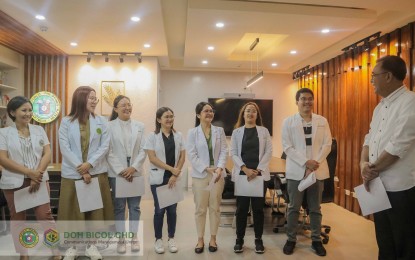
DOCTORS TO THE BARRIOS. Department of Health (DOH) Undersecretary and concurrent Bicol Regional Director Dr. Nestor F. Santiago Jr. (right) talks to the new doctors who will be deployed to different rural health units in the region after taking their oath on Monday (Feb. 12, 2024). They graduated under the Doctors to the Barrios Program of the DOH in 2023. (Photo courtesy of DOH-Bicol)
LEGAZPI CITY – At least 12 doctors who graduated last year under the Doctors to the Barrios (DTTB) Program of the Department of Health (DOH) have been deployed to the rural health units of five provinces in the Bicol region to give healthcare services to the local community, particularly in far-flung areas.
In an interview on Tuesday, Roel dela Rosa, DOH-Bicol training specialist, said the 12 new doctors who took their oath of office before DOH Undersecretary and Concurrent Regional Director Dr. Nestor F. Santiago Jr. on Monday will now be added to the 26 DTTBs serving the region, for a total of 38.
"They are DOH medical scholars who will serve remote areas in the region for three years," Dela Rosa said.
The 12 will serve the towns of Polangui and Sto. Domingo in Albay; San Vicente in Camarines Norte; Cabusao and Garchitorena in Camarines Sur; Arroroy, Batuan, Claveria, San Fernando, Dimasalang and Uson in Masbate; and Matnog in Sorsogon.
Dela Rosa said for equal distribution of doctors, certain criteria were determined in prioritizing areas for the deployment of DTTB graduates.
"It was evaluated and determined based on different measures like the areas that were doctorless, it must be within 4th to 6th class municipalities, low doctor-to population ratio, high number of population in geographically isolated and disadvantaged areas (GIDA) and high poverty incidence," he said.
Dela Rosa said the DTTB graduates are expected to provide healthcare services and develop local health programs based on the needs of the locality they are serving.
They will also conduct regular medical consultations and refer severe to critical cases to higher health facilities, manage the health information system, health emergencies, disaster preparedness, and responsive activities related to public health.
The Doctors to the Barrios program was created in 1993 to address the lack of doctors serving in rural areas. (PNA)
